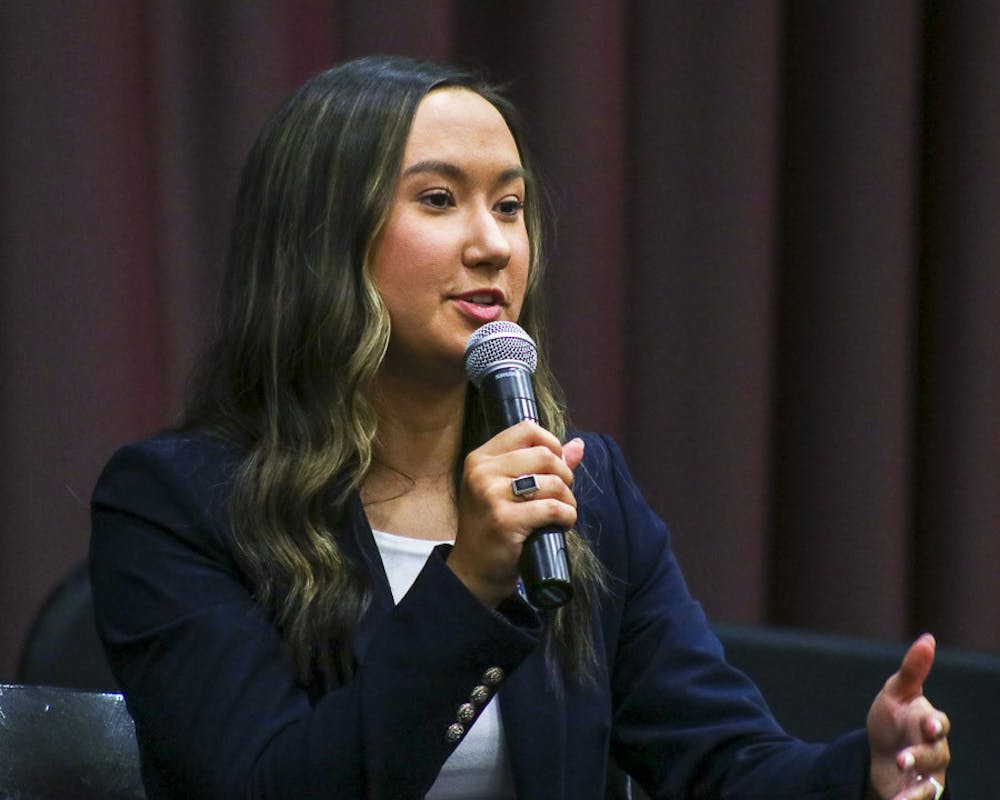After legislation to limit spending on Student Government campaigns was halted during this year’s elections, candidates have voiced mixed opinions on how to create the most fair and level playing field for future elections.
On the first day of elections, student senator Ian Herd filed a complaint with the Constitutional Council claiming that newly-instated campaign spending caps were unconstitutional. Upon receiving the challenge, the Constitutional Council barred the elections commissioners from enforcing the bill until a trial could be held.
Herd withdrew his complaint Feb. 22 when elections concluded, however. He had originally complained that the legislation was not in effect by Feb. 1, when legislation impacting elections is required to be finished by, because University President Michael Amiridis had not signed it but felt that this complaint was no longer relevant after the election cycle. This leaves the legislation now in effect for further elections without a hearing ever being held.
Students running for office originally planned for the spending caps, which vary depending on the type of ticket and the number of people on it, to be in place this election season after the student senate overrode Student Body President Reedy Newton’s veto of the bill.
Emmie Thompson, who was elected student body president, said that because the bill was rushed in order to be voted on before the election cycle, she sees some loopholes in it.
"If we're going to do this, let's do it right. Every other SEC does have them, so I do think we're probably a little behind in equity perspective on that. So I do support the idea of campaign spending limits. I wouldn't necessarily say I support this particular bill,” Thompson said.
One of Thompson’s concerns is that the bill does not address in-kind donations adequately. An in-kind donation is any donation of goods or services, rather than money.
“I think the biggest thing for me is that an in-kind loophole, because theoretically, if I had a good friend that had a t-shirt company, they could donate me 1,000 t-shirts as an in-kind, and that's not me spending money. So I think that needs to be addressed,” Thompson said.
Abrianna Reaves, who ran alongside Thompson and was elected vice president, agrees with Thompson that the bill left room for different interpretations.
“People are very smart, there's ways to go around things, and I think that without proper revisions and without proper details, that it could just make it much worse than its current state. I'd hate to see that happen, personally, because it's not equitable,” Reaves said.

Thompson and Reaves said that they had decided to spend $2,500 maximum before they knew what the limit would be and only spent around $2,100. They also received an in-kind donation of half of their 250 t-shirts from a friend of Thompson’s father who runs a t-shirt company. The limit for a ticket with two executive candidates is now $2000 with the caps in place, with another 10% allowed in the case of a runoff.
Reilly Arford, who ran for against Thompson for the presidency, said he is in favor of campaign finance reform and the campaign spending caps set by the legislation.
“(The Constitutional Council) did a fantastic job in making sure that it was fair and equitable for both sides of the train tracks and making sure that we're not spending exorbitant amounts of money, but knowing that you still can, based on how many people are on your ticket, spend enough money to be a contender,” Arford said.
Arford said that he spent around $1,300 to $1,400, which is under the $1,500 set for a single executive campaign. Arford said he did pay attention to where the limit would be, but all of his spending was from his own pocket, and he did not accept any in-kind donations.
Cameron Eubanks, who was elected speaker of the student senate, said he spent $1,100 on his campaign, under the same $1,500 limit that would have existed for his ticket. His parents gave him an in-kind donation of a tablecloth and a bag of candy, but Eubanks included the $25 spent on that in the total.
“Even when it was announced that it wasn't going to be active for this election cycle because of the injunction, we still kept to the limit,” Eubanks said. “It's something that Student Government has been trying to do for years, and it is something that the student senate passed, and we wanted to respect that.”
Jordyn Velez, who ran against Eubanks, said that the removal of the campaign spending limits did not impact her spending at all. Additionally, Velez said that she supports campaign finance reform and would have liked to have the caps set even a little lower.
"It didn't impact (me) at all because I don't have that type of money, and I will never have that type of money," Velez said. "I'm not comfortable asking those people for large amounts of money. I got really lucky. Everyone on the campaign was willing to give me money. I didn't end up asking for it because I felt since the campaign was mostly focusing on me that it wasn't necessarily fair to ask for.”
Velez ran on The Time is Now campaign, with seven senators joining her on the ticket, and said she spent a little over $300. Her banner and posters were in-kind donations and not accounted for in that number. Under the current cap, she could have spent up to $2250.
Hannah Augsbach Lamma, who was elected student body treasurer, said the proposed campaign spending limit also had no sway on her plans because, even if it had been in place, she wanted her campaign to be about communication and not material things.
“I knew if I wanted to run for an (executive) position, I wanted to do it based off of merit and not so much based on what I could buy,” Augsbach Lamma said. “I still think it's a great concept, and I think that they should implement it just to make things more accessible for students who maybe can't spend a lot for the campaign, but for my individual campaign, it didn’t really have an effect.”
Augsbach Lamma, who also would have been subject to the $1,500 cap, said she spent around $100.
Her opponent, Brandon Badinski, ran on the Palmetto Party ticket with 25 senators. Badinski said he supported the idea of the spending limits bill, but the execution was flawed.
“The fact that they were trying to do it when they hadn't had it in place at the first candidates meeting, even though it wasn't formal, the fact that they wanted to invoke it ... seven days before we started campaigning. That was a bit (absurd). People had already invested in our campaign materials. But no, I didn't exceed it, and I didn't plan on exceeding it, and my spending didn't change based on the outcome of that bill,” Badinski said.
Badinski said he does not find his specific spending relevant and did not keep track of it. He did not respond to requests for comment from The Daily Gamecock on whether he received in-kind donations or whether senators on his ticket helped pay for it. If the spending caps had been in place, his ticket could have spent $2250.

